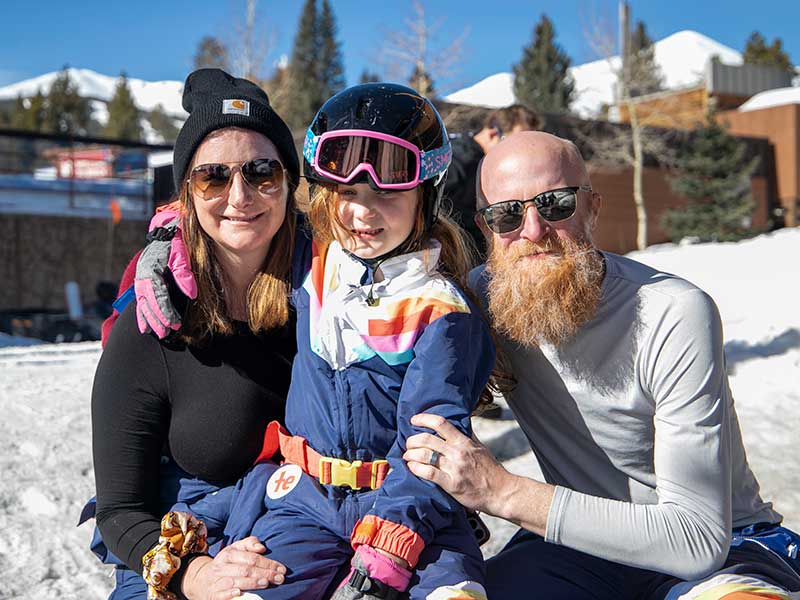
Ellie, Cecilia, and Billy Bennett pose for a picture at Breckenridge Ski Resort.
No parent, no matter who you are, wants to hear the phrase “gross white matter tract damage” from their child’s pediatrician. Or for that matter, you don’t want to hear “your child has a 22q13.2 deletion” either. While to the layman this just sounds like a bunch of gibberish, it hit a little too close to home for pediatric gastroenterologist and pediatric nurse practitioner Billy and Ellie Bennett when their 13-month-old daughter Cecilia was diagnosed with Phelan-McDermid syndrome. Billy and Ellie’s lives changed in an instant as the syndrome that has only been diagnosed in roughly 3,000 people worldwide took center stage in their lives.
The calendar had just flipped to 2017 and 13-month-old twins Cecilia and Silas were moving from infancy to the toddler stage, typically characterized by crawling vigorously and uttering a few words here and there. Since it’s normal for one twin to fall behind the other in terms of hitting their developmental milestones, it wasn’t overly concerning that Cecilia was continually being trumped by Silas. With both parents working in pediatrics, they simply told themselves that this is common and she would eventually catch up.
But then they started noticing that something wasn’t quite right. When they called her name, Cecilia wouldn’t look directly back at them. Or when she did return eye contact, it felt like she was looking through them, not at them. They asked themselves if she might be experiencing hearing and/or vision issues. A simple trip to the pediatrician returned normal hearing and vision tests, but Ellie’s motherly intuition had her searching for more answers. Another trip to the pediatrician was in the books, albeit this time for chromosome testing and a brain MRI.
Ahh, those motherly instincts were correct. The results of the MRI came back showing an arachnoid cyst, a noncancerous fluid-filled sac on the brain, and gross white matter tract damage.
“Our first reaction was, okay, she’ll have some motor delay,” remembers Ellie, a Saint Louis, MO native. “So she may not dance as her friends will, or take dance class, ya know, we were kind of processing what that might look like for her future.”
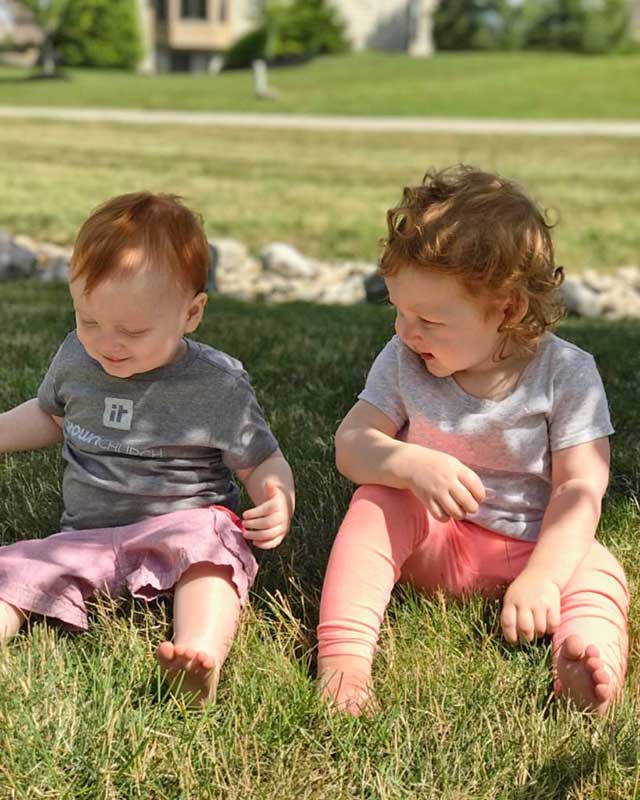
Silas and Cecilia having a laugh.
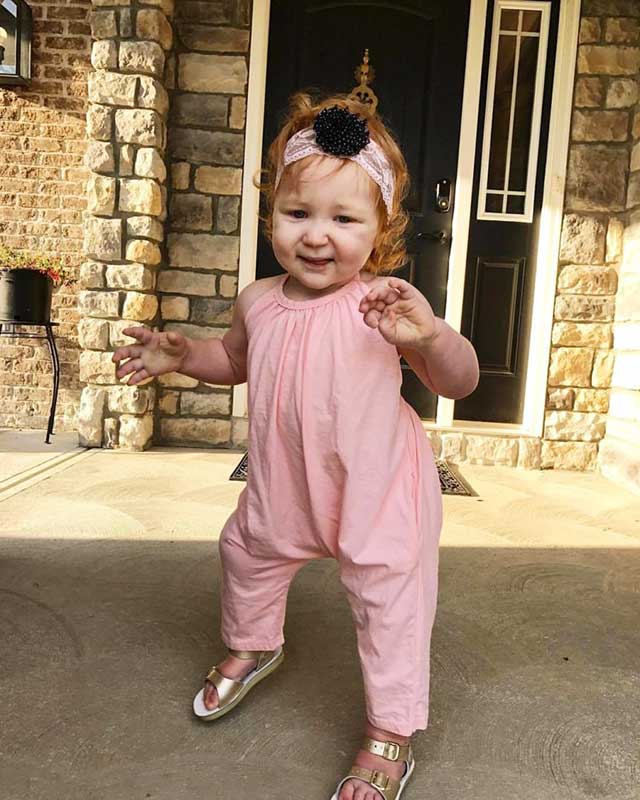
All dressed up and nowhere to go.
Billy and Ellie had come to grips with the diagnosis and were ready to move on when a phone call days later rocked their world a little bit more.
“She (pediatrician) said ‘Billy, I don’t know what I’m looking at here,” paraphrases Ellie. “‘It’s the 22q13.2 deletion and I’m not sure what it is.’”
Again, words you never want to hear from your doctor.
“So the first thing we did was Google 22q13.2 and Phelan-McDermid syndrome came up,” Ellie continues. “I still remember it like it was yesterday. All we saw was she may never talk, she may never walk, and all that sort of stuff.”
Cecilia was diagnosed with Phelan-McDermid syndrome, or PMS, a rare genetic disorder caused by a deletion of chromosome 22 or by a variant in the SHANK3 gene which causes a wide range of symptoms including low muscle tone, developmental delay, intellectual impairment, and a high percentage are diagnosed with an autism spectrum disorder. Another blow to the Bennett family, leaving Ellie floundering for answers.
“I had already been processing the brain damage when this second thing went off and I was beside myself,” said Ellie, a mother of four. “Both Billy and I spend our lives helping kids and you never think that you’re going to be in that position on the parents’ side. That night a million thoughts raced through our minds… she’ll never get married, she’ll never go to college, she’ll live with us the rest of her life. We realized that we were grieving the loss of life we thought our child would have and we didn’t have any control over it anymore.”
With the abundance of medical training that exists between the two parents, they managed to gather control of the situation by eliminating “Dr. Google ” and going straight to the source… the Phelan-McDermid Syndrome Foundation (PMSF) and Dr. Katy Phelan herself. While the syndrome was identified by Dr. Phelan in the 1980s, there’s still a general lack of information available in terms of research purposes, but the good doctor and the Foundation were able to provide some solace to the family right away.
“There’s so much good information that the foundation initially gave us,” says Ellie. “Things such as supplemental tests that we’ll need to get done, this percentage of kids can do this or that, and so on. They keep a database of this information and it really helped us to process the diagnosis right away.”
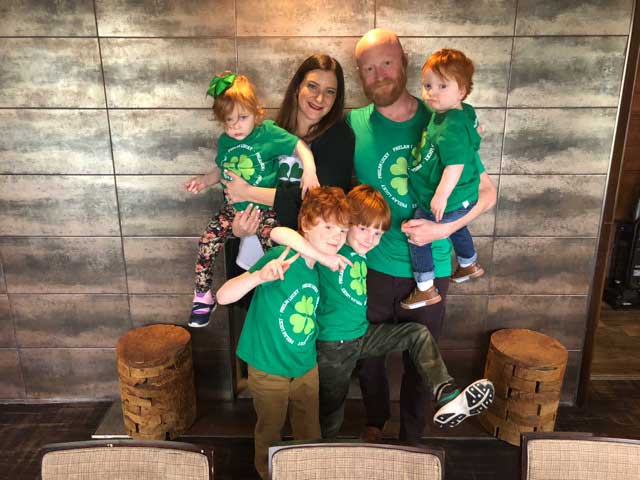
The Bennett family in all its glory.
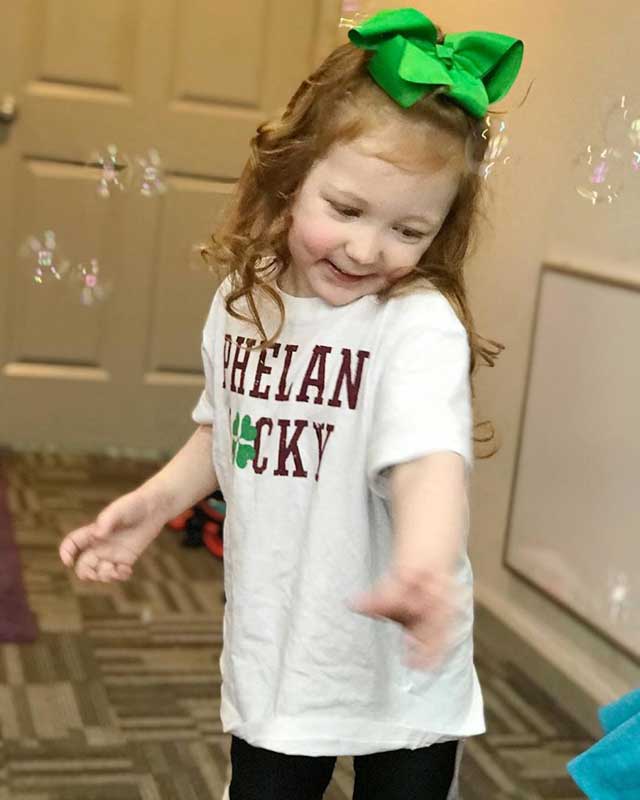
Cecilia is "Phelan Lucky!"
Now with a place for information and support secured, it was on to figuring out what life was going to look like moving forward. The tests showed that Cecilia was in fact missing her SHANK3 gene, which is associated with autism, but that is only one of the 92 pieces of genetic material that were unaccounted for. While she exhibits some autistic-like behaviors, the absence of information about what the other 91 missing genes and brain damage are causing is a mystery. Medically, Cecilia doesn’t have the ability to sweat, has a heart murmur, chronic ear infections, gross motor delay, abnormal brain spikes in her frontal lobe, is not potty trained, and has insomnia, in addition to all of her other intellectual disabilities. But, when it comes to the “prototypical” Phelan-McDermid child, she seems to be a bit of an outlier as she has higher abilities compared to others with the syndrome.
“Because she isn’t your ‘typical’ PMS child, it almost makes it more difficult to explain to other people,” says Ellie. “It’s hard to explain when she is talking a certain way or having a meltdown or can’t keep up with us. You feel like you have to explain yourself because she’s not visibly in a wheelchair or anything like that. She looks ‘normal,’ and presents ‘normal.’ It’s just all the little things that people normally wouldn’t notice.”
While applied behavioral analysis (ABA) therapy has been the go-to treatment for Cecilia’s condition over the years, one hallmark trait of PMS that the Bennett’s are now facing – 5 years later – is regression, or the loss of skills she once had. Recently, Ellie has noticed a bit of regression in terms of Cecilia’s behavior, but she doesn’t feel the need to focus on what might be to come on the horizon.
“We try to live every day to the fullest because we don’t know what the future holds for her,” says Ellie. “Do you want to live in fear of the future? I don’t know that we prepare for anything regression related, so we just try to keep up with her therapies, because it really hasn’t been researched that there is anything you can do, scientifically, to stop regression in kids with PMS. So, you have to decide if you are going to keep thinking about that or are you going to just live in the moment. That’s the hardest part.”
Right on cue, as if Make A Wish Ohio, Kentucky & Indiana were tuned into this carpe diem motto, the Bennett family received a phone call offering them the trip of a lifetime. Cecilia was nominated by one of her physicians for an opportunity that the family of six might never get the chance to do again – a trip to Breckenridge, and specifically skiing with the Breckenridge Outdoor Education Center (BOEC). Cecilia’s love for the snow was a deciding factor, and that, coupled with the chance to ski for the first time ever, was just too much to pass up. So, Billy, Ellie, Liam, Oliver, and Cecilia’s twin brother, Silas, hopped on a plane for the mountains of Colorado.
“We decided to seize the day and make the trip to Colorado,” says Ellie. “It was something that we’d never done all six of us together, get on a plane and go on vacation. We don’t get to experience a lot of things that a lot of families get to experience, because I guess you could say we’re on guard all of the time.”
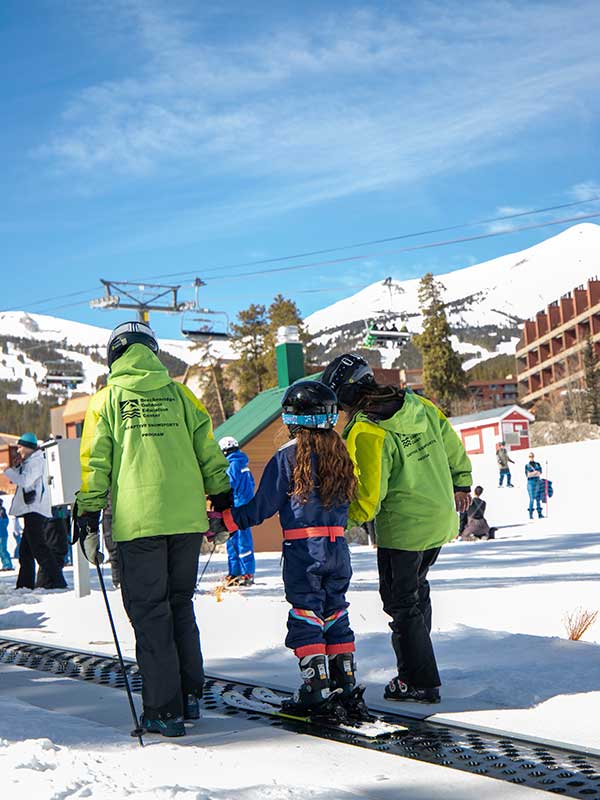
Cecilia tackles the magic carpet.
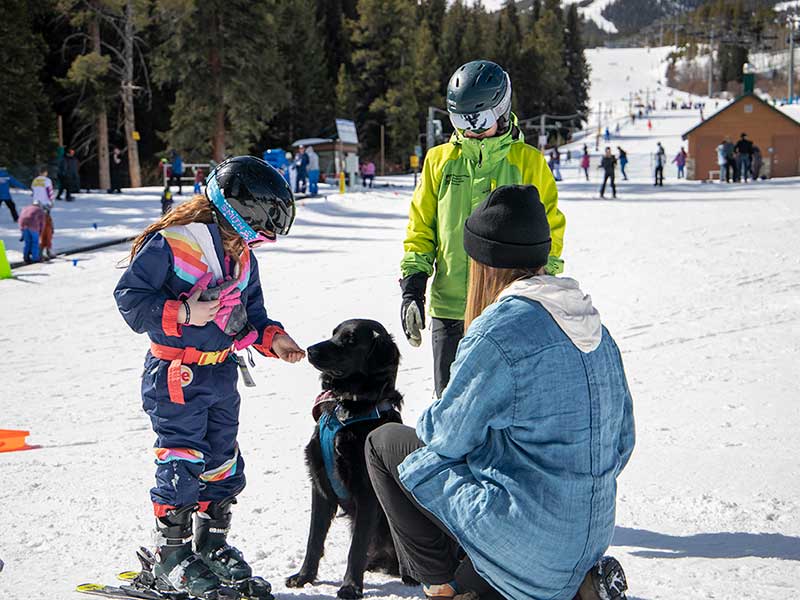
Receiving some inspiration from River the office dog.
In between a mix of other winter pastimes that Breckenridge has to offer, Cecilia participated in two days of lessons with BOEC’s Adaptive Ski & Snowboard Program. While the magic carpet was in order to get her familiar with being on skis, the allure of the chairlift was what caught the 6-year-old’s attention immediately. A few runs up and down the carpet and onto the Quicksilver lift it was. And, truthfully, the high-flying adventure of the chairlift was her favorite part of the adventure. Well, that, and just playing in the snow.
“Cecilia likes adventure and extreme situations so I think she thought she was on a rollercoaster,” Ellie says, describing her daughter’s chairlift experience. “She’s never been on a roller coaster, but she likes jumping on the trampoline and likes going fast if we’re pushing her in a wagon, so I think it was just an extension of that.”
And to distract her from the task at hand, BOEC Adaptive Ski Instructor Gardner Popp was able to successfully get Cecilia up on her skis by enticing her with Colorado’s “white gold.”
“Throwing snow at each other and playing in the snow is how Gardner ultimately got her attention,” says Ellie. “It was incredible that she was able to adapt like that. We didn’t know what Cecilia was going to do, so it was super cool to witness how you guys (BOEC) can adapt to the individual needs of a child.”
New environments can be intimidating for many, but we were able to make the setting more comfortable by playing in the snow together,” says Popp. “Some light-hearted fun, through familiar activities, motivated Cecilia to get going on her skis!”
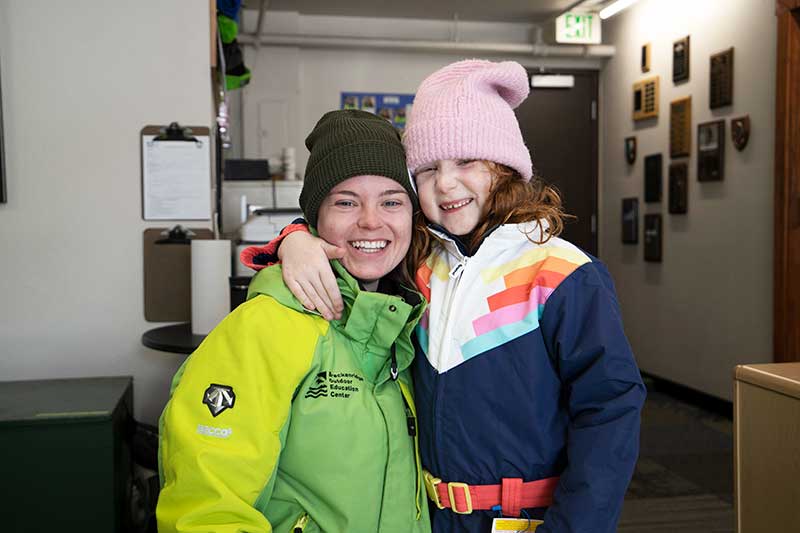
BOEC Instructor Gardner Popp poses with Cecilia.
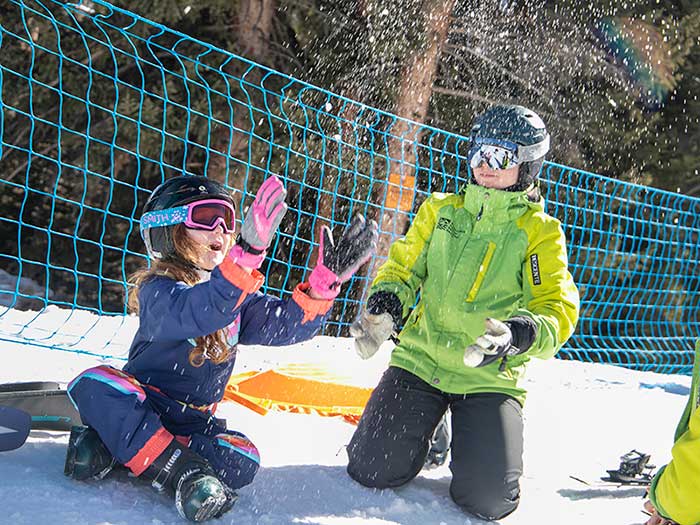
Gardner and Cecilia play in the snow.
Most mothers of a child with special needs would be at odds with letting their child participate in such an experience, but Ellie et al. seem to defy the norm when it comes to getting Cecilia out of her comfort zone.
“We want her to get to the best of her ability that her body and mind can handle,” says Ellie. “It was such a controlled environment that I was all for it and I loved seeing it because we’d never done anything like that before. I knew she would be safe, so it was pure joy and happiness getting to see her do something like that.”
The aspect of safety in a controlled environment is what the BOEC strives for, placing safety at the top of mind when sending our staff and participants into a great unknown such as a ski resort. Paradoxically, however, in Cecilia’s day-to-day life, control is the name of the game. There are just so many unknowns to a child with PMS, that playing it close to the chest is paramount. That’s why it was so special - and beneficial to the Bennett family - that they could let loose and place a serious amount of trust in the BOEC.
“Sending her out with you guys isn’t typical for us,” says Ellie. “But I immediately felt comfortable. I could tell from the minute we walked in that it was a very relaxed atmosphere, but at the same time with safety protocols in place. Honestly, the BOEC experience is what made our trip. Just the ease with which you guys work with a special needs family is incredible. Giving us the flexibility to step back and let Cecilia do her thing was something really incredible that we’d not been able to do before.”
While Cecilia’s ski days were hit or miss depending on what kind of intellectual frame of mind she was in at the time, simply being outside seemed to have its therapeutic value regardless of circumstances, something that is clearly stated in BOEC’s mission statement.
“Cecilia is just better when she’s outside,” Ellie says. “I am too. I mean who’s not? To have that as part of BOEC’s mission is not just for physical health, but for mental health as well. That’s huge, and kind of why we chose the ability to explore mountains and be out in nature when Make A Wish came calling. My kids have never been on a mountain, but being outside and exploring is when they are their best selves.”
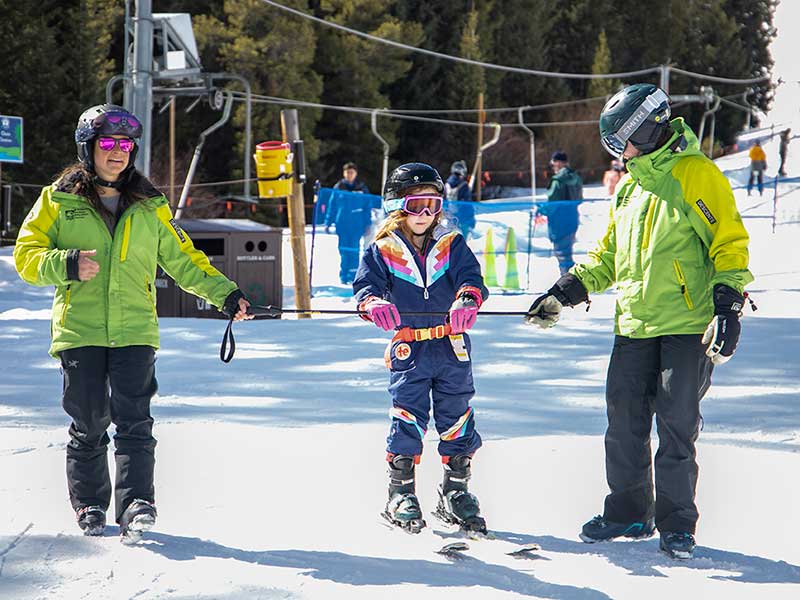
BOEC Instructor Gardner Popp (right) and Volunteer Barbara Marcus (left) aid Cecilia in her adaptive ski lesson.
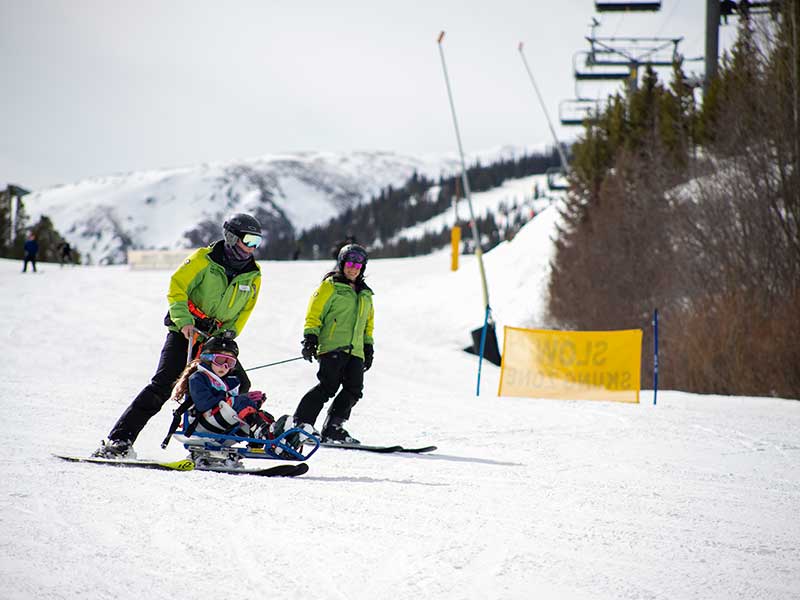
Cecilia trades in her stand-up skis for a ride on a sit-ski!
Upon returning home to Carmel, IN, the Bennett’s had plenty of time to reflect on their recent experience. While corralling four children - one with special needs - toting ski equipment back and forth, and dealing with the hustle and bustle of one of North America’s busiest ski resorts is not for the faint of heart, the memories that were made are irreplaceable. Even for Cecilia.
“She now talks about Colorado and skiing,” says Ellie. “She could be throwing a fit, but two days later she will say ‘I want to go skiing.’ “That’s just kind of how her syndrome and brain are, but I think she’ll have the memory of this experience forever.”
She may not have to hold onto these memories because if mom gets her way, there'll be plenty more reminders to add to the memory bank, as there will most likely be another trip to the BOEC on the horizon.
“For sure, one hundred percent,” says Ellie when asked if she would come back. “A lot of the apprehension about doing things like this as a special needs family is the unknown. Now that we know about the BOEC and how things are going to go, it just makes it so much easier in your head and to explain to your non-neurotypical kid.”
As the 2021-22 winter winds down, another trip to Colorado isn't necessarily feasible this year, so in the meantime, Cecilia will have to keep busy with kindergarten, slam dunks on her basement basketball hoop, swimming, riding her tricycle, and, of course, dancing like nobody’s watching.
As for the Bennett family, the status quo is still not on the agenda. While the three boys keep occupied with various activities in the Indianapolis suburbs, Billy is busy with his career in pediatrics and serving on the PMS Foundation Medical Advisory Committee, and Ellie has paused her nursing career to run her very own nonprofit, Cecilia’s Advice, aimed at raising money and creating awareness about Phelan-McDermid syndrome.
“I started Cecilia’s Advice so we could raise money for the PMSF for several things,” says Ellie. “Most importantly, though, is so we can collaborate with other specialties and physicians to raise money for research so we can figure out more about our kiddos. There’s no cure, so there’s a lot of research that needs to be done to figure out what goes on with them.”
While the PMSF and other medical centers around the country conduct their research and studies, those living with PMS and their families continue to live their lives the only way they know how. For the Bennetts, that means living life to the fullest and giving Cecilia all of the amazing experiences that she deserves. When Ellie thinks back to her family's BOEC experience, she urges others to do the same.
“I feel like anyone with any type of disability deserves an experience like any other neurotypical kid or person,” she states. “Take that leap even if it sounds like too much to do. They need those fun memories and those adventures and experiences that their brothers, sisters, or friends can do. I don’t know many places like the BOEC, you’ve done a fantastic job there.”
Did you know that BOEC is able to keep its lesson fees low for participants like Ellie so we can remain as inclusive as possible? We rely on generous donors to make up the difference. To make a tax-deductible gift, please visit BOEC.org/give today.

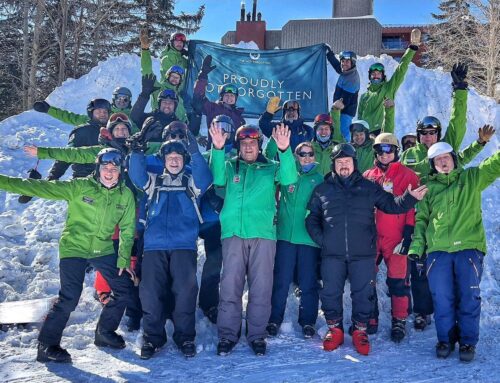
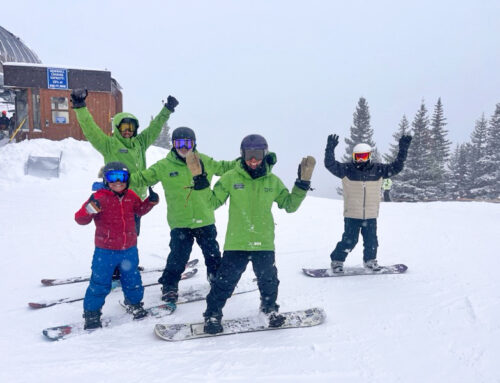
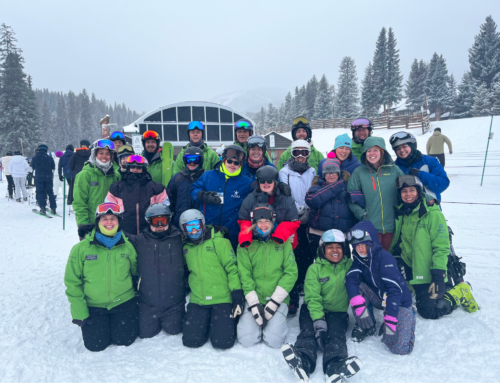

Leave A Comment